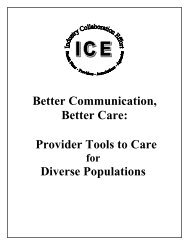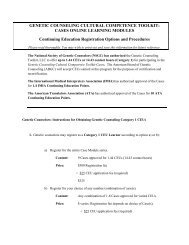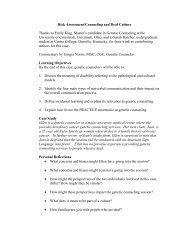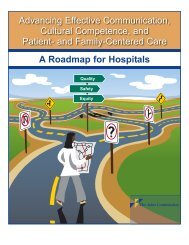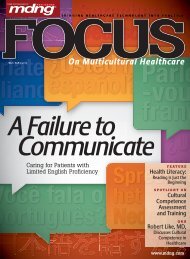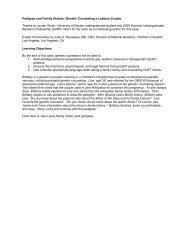reflection 3 - Genetic Counseling Cultural Competence Toolkit
reflection 3 - Genetic Counseling Cultural Competence Toolkit
reflection 3 - Genetic Counseling Cultural Competence Toolkit
Create successful ePaper yourself
Turn your PDF publications into a flip-book with our unique Google optimized e-Paper software.
Reflection on “When Bad Things Happen to Good People” by Christine Spaeth,<strong>Genetic</strong> Counselor, written in her second year of genetic counseling training“…We do not understand this tragedy. We know we did nothing to deserve it, but neitherdoes a child in Africa dying of AIDS, neither do the invisible children walking the nightaway to avoid being captured by the rogue army, neither does the baby elephant watchinghis community being devastated for ivory, neither does the Mexican child looking forfresh water, neither does the Appalachian infant killed in the middle of the night in hiscrib in the home his father built with his own hands being run over by a boulder becausethe land was destabilized. No one deserves a tragedy.”Excerpt from Professor Nikki Giovanni’s Convocation speech at Virginia TechApril 17 th , 2007Too often, we meet individuals who have more than their share of tragedy, likethe family with 3 children with seemingly unrelated congenital birth defects or thewoman who says that cancer “ate up my family”. Sometimes it seems as though thepeople who have the fewest resources have a disproportionate amount of trouble, and wewonder how that could be fair. The absolute unfairness of a child suffering with achronic illness becomes almost unbearable. We question why bad things happen to goodpeople because it is impossible to have faith without a sense of justice, because a worldwithout control is fickle and frightening, because we need to have a way to prevent thoseterrible things from happening to us. By blaming those who have tragedy, we hope toexplain away our own risks and pretend we are safe.We ask why bad things happen to good people because we need to find a reason.When explain to a family that a chromosomal anomaly is sporadic, and therefore unlikelyto recur, we mean to be reassuring, but for so many people that is not reassuring news atall. People need an explanation for their bad news, so they can try to prevent it fromhappening again. When we are not able to provide an explanation, they are left in asituation they are unable to control. However, as Harold Kushner point out in his book,
people may able to find a purpose in their bad news. It may show them strength they didnot know they had or connect them to their community in a way unimaginable. That iswhere we can provide the hope in a hopeless situation.People look to religion to help define a greater purpose and provide a moralframework for our lives, but too often people use religion to judge and blame others. Iremember the minister of the Lutheran church I attended giving a sermon right after thedevastating tornado that hit Montgomery a few years ago. He was outraged because aparishioner had said they were blessed that the tornado did not damage their house or ourchurch; he asked if that meant that the victims were cursed or less religious? I believethat bad things happen to good people, but I refuse to believe in a supreme being whocarelessly deals out suffering. I can believe in a supreme being that provides hope forthose who are suffering.While bad things happen to good people, bad things also reveal character andstrength. I had the opportunity to work with a very wise counselor who has experiencedmore than her own share of tragedy. She told me that when asked by patients if shebelieves in miracles, she would reply that she did but that the miracles we get are oftennot the ones we asked for. Despite a personal history of infertility and pregnancy loss,she works in a prenatal setting and is the most compassionate and empathetic counselor Ihave ever met. That is the miracle. Harold Kushner used his experiences and his son’spain to write a book that has touched millions of people. That is the miracle.The anniversary of the Virginia Tech shootings occurred while I was readingHarold Kushner’s book and I happened across a transcript of poetry in one article. I wasimmediately struck by how Harold Kushner’s book and Nikki Giovanni’s poem explored
common themes: grief, search for explanation and meaning, finally replaced by hope andresiliency. Two eloquent authors from two different worlds coming to the sameconclusion: bad things happen to good people because they can. It is what good peopledo with their experiences that ultimately matter.


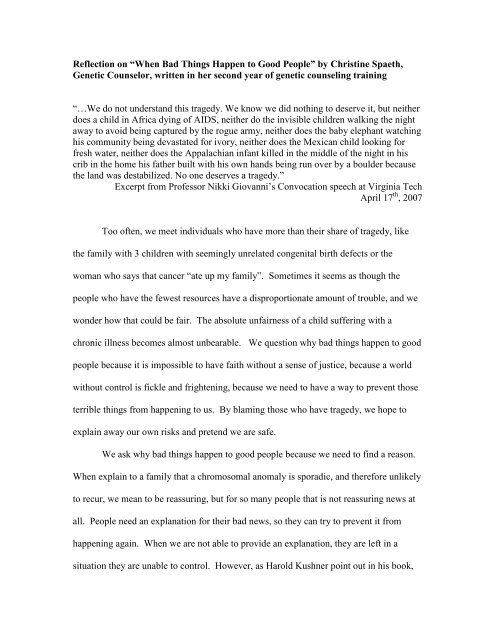
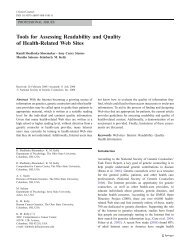

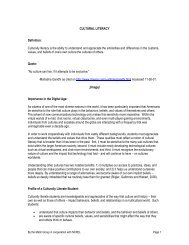
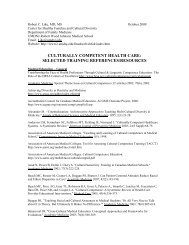
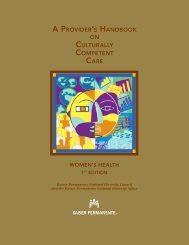
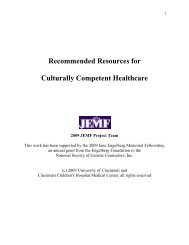
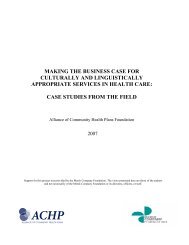
![Breaking Bad News PPT[1] - Genetic Counseling Cultural ...](https://img.yumpu.com/35003134/1/190x146/breaking-bad-news-ppt1-genetic-counseling-cultural-.jpg?quality=85)
